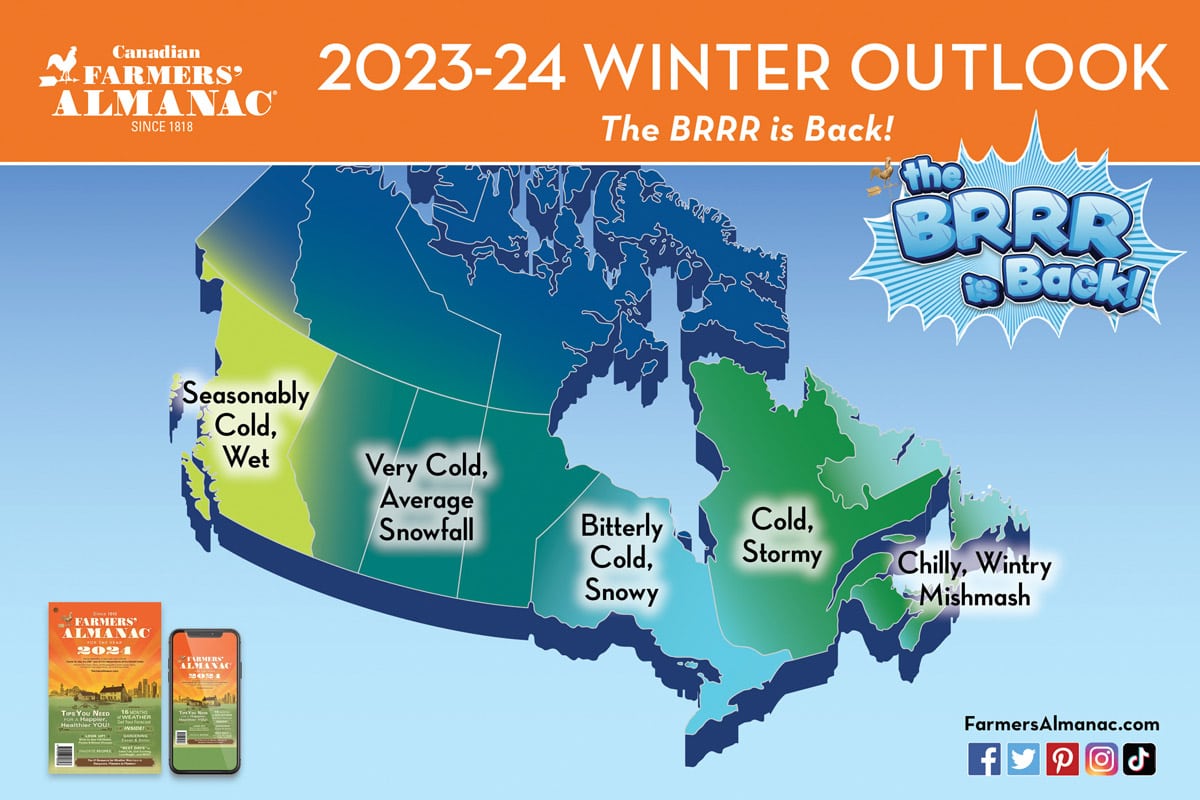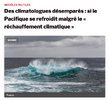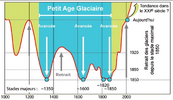If the tendency of the past few months holds, when winter comes, it might be a real shock to most people. I wouldn't be surprised if this winter is the onset of the Ice Age.
Had not looked into the Farmers Almanac, and so did just now (at least for above and below the 49th in North America) - Get your Parkas out:
Remember last winter? Yea, it was an odd one. So, what’s in store for this coming winter? Will the temperatures remind you of a more traditional Canadian winter? Will snow lovers rejoice?
The BRRR Is Back!
Winter officially starts on Wednesday, December 21, 2023, but cold temperatures will blow in before then. In fact, meteorological winter starts on December 1. (See your region’s December forecast.)
[...]
Reason For The Return Of The “Brrr”
Yes, Canada, traditional winter weather is coming back. Get ready to enjoy hot chocolate by the fireside, skiing, ice skating, and all things winter! Very cold temperatures and lots of BRRRs are expected for much of Alberta, Saskatchewan, Manitoba, and westernmost Ontario. Newfoundland and Labrador will experience icy temperatures, but our predictions suggest that this area won’t be as cold as the middle of the country. Only British Columbia will see near-normal temperatures throughout the winter season.
Got Snow?
It’s not winter without snow, right? Where should snow-lovers rejoice? The Great Lakes region! If you live or plan to visit areas around the Great Lakes, you should get your fill of snow as our forecast points to above-normal amounts.
Both coastal regions of Canada will see a mixed bag of wintry precipitation. British Columbia will see another wet, white winter with temperatures just above and below the freezing mark.
Some Winter Weather Advisories Include:
On their main page, it looks to the Sun:
- Wintery mix of rain, sleet, and snow in the second week of January over the Pacific Coast, Ontario, Quebec, and the Maritimes.
- Heavy mountain snows over the Rockies and Prairies during the first week of February.
- A coastal storm affecting Quebec and the Maritimes during the second week of February, followed by a wave of frigid air.
- March could go out like a lion with stormy conditions nationwide; a white Easter Sunday seems possible for southern Ontario, Quebec, and Atlantic Canada.
Sun Spots May Mean Arctic Shots
With the solar max not expected until 2025, the current cycle is stronger than the previous one: The National Oceanic and Atmospheric Administration recorded 163 sunspots in June, about twice as many as had been anticipated for the period and more than in any other month in two decades.
The relationship between solar activity and the phase of the stratospheric winds over the equator (known as the Quasi-Biennial Oscillation) will influence the strength of the wintertime polar vortex over the North Pole. A weaker polar vortex may open the door for shots of Arctic air to spread south across Canada into the United States.
Catching after looking further, the US might see this or, a much different picture:
How Cold And Snowy?
Our extended weather forecast, which is based on a mathematical and astronomical formula, calls for below-average temperatures and lots of snowstorms, sleet, ice, rain for much of the Great Lakes and Midwest areas of the country, as well as central and northern New England, especially in January and February. (Brrr…)
When will the first snowfall of the season be?
An unusually snowy and wet winter is also predicted for the Pacific Northwest. Should an El Niño materialize, it could direct the subtropical jet stream into California, translating into copious amounts of rain and snow across the entire Southwest.
Winter in the Great Plains and Rockies will usher in plenty of cold temperatures and occasional bouts of storminess, bringing widespread rains and snows.
Texans will need to bundle up, as unseasonably cold weather is forecast throughout January and February, with a possible major winter storm in mid-January.
The Southeast and Florida will see a wetter-than-normal winter, with average winter temperatures overall, but a few frosts may send many shivers to snowbirds trying to avoid the cold and snow back home.
For those of you living along the I-95 corridor from Washington to Boston, who saw a lack of wintry precipitation last winter, you should experience quite the opposite, with lots of rain/sleet and snowstorms to contend with.















